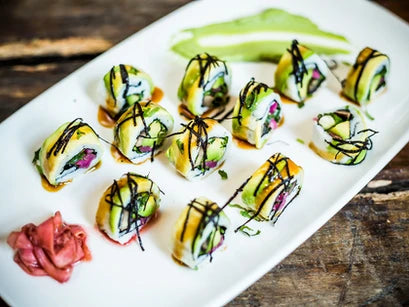Leave the Fish, Take the Algae
You may have heard about how important omega-3s are in a diet. You may have also heard that one would need to consume fish or take fish oil supplements in order to reap the benefits. However, omega-3s, which are unsaturated fatty acids essential for proper brain and nerve functioning, are found in our everyday plant foods. You see, fish are primarily getting their share of omega-3s from algae.(1) So if we cut out the middle man (or fish), we can receive our DHA Docosahexaenoic acid) and EPA (Eicosapentaenoic acid), omega-3 fatty acids directly from the source. This avoids pollutant contamination from the ocean and is a sustainable choice on an ecological level. If you choose to take a vegan, algae supplement, the algae used doesn’t actually come into contact with the ocean. It’s grown in tanks, removing the potential pollutants.(2) Seaweed is also a wonderful option for long-chain, highly absorbable, and toxin-free omega-3s.(3) Showing compelling neuroprotective and reparative properties, seaweed contains polysaccharides which exhibit anti-inflammatory and antioxidant activities. These properties help to protect against Alzheimer’s Disease as inflammation and oxidative stress are a couple of the leading triggers in the progression of the disease.(4) Seaweed has been used in medicines since 3000 BC.(5) You may consider adding plant-based sushi into your dinner rotations for optimal brain health.

Flax For Longevity
Flax, one of our oldest crops in the world, includes three main bioactive compounds; lignans, fiber, and alpha-linolenic acid (ALA).(6) ALA is a plant-derived omega-3 fatty acid and plays a very important role in brain development. Flaxseed is one of the richest sources of ALA and can be metabolized in the body into DHA and EPA. The combination of these three fatty acids results in potential health benefits which are extensive and widely reported. The trio is known to reduce hypertension, cardiovascular disease, diabetes, cancer, arthritis, neurological disorders, and osteoporosis.(7) Grinding your flaxseeds or buying already ground flax is the easiest way to consume, digest, and absorb the essential nutrients. Ground flax has a nutty taste and is easy to add into our everyday diets through baking, smoothies, and topping off your oatmeal or yogurt bowls in the morning. Ground flax also makes for a very easy egg replacement in plant-based recipes. Recipes may vary, but a typical flax egg is about 1 T. of flaxseed meal: 2.5 T. of water. Let sit for a couple minutes to thicken, and use in your favorite muffin, cookie, or cake recipes.
The Proof is in Chia Pudding

Said to have been first used in Aztec diets and herbal mixtures, chia seeds have a rich history and powerful healing properties. Similar to flax, chia seeds provide a wonderful source of the omega-3 fatty acid, alpha-linolenic acid (ALA).(8) Oil obtained from chia seeds accounts for 30-33% of fatty acids, the dominant fatty acids being ALA which makes up for about 60% of the acid pool, and linoleic acid (LA), an omega-6 fatty acid, constituting approximately 20% of the oil.(9) The omega-6 to omega-3 ratio is favorable. The reason being is that omega-6 fatty acids are pro-inflammatory (capable of promoting chronic disease) and omega-3s are anti-inflammatory (capable of inhibiting chronic diseases).(10) The ratio of omega-6 (sunflower oil, safflower oil, corn oil, etc.) to omega-3 (chia seeds, walnuts, flax seeds, spinach) has increased from 1:1 to today’s 20:1! The consequences of such a drastic shift can be attributed to changes in our health including diabetes, heart disease, and obesity.(11) Try working chia seeds into your routine by adding them to overnight oats, making chia pudding, or soaking them and adding them to your smoothies. The soaking method helps with digestion and proper absorption of its nutrients.



Where to Find Omega-3s on P.S. & Co’s Menu
-
Organic Cake Slices - Always on the menu, with ever changing flavor combinations.
-
Organic Coconut Yogurt Bowl - with house-made organic nut & seed muesli.
-
Organic Protein-Packed Amaranth Porridge - with Fresh Fruit, Maple Pecans, and Fresh Jam
-
Organic Cupcakes - Also always on the menu, with rotation flavor combinations.
-
Organic 4” Cake
-
Organic 4” Lime Tarts
-
Organic 4” Fresh Fruit Tarts
-
Organic Plain, Everything, and Sesame Oat Flax Bagel options
-
Organic Lemon Chia Muffins
-
Organic Protein Packed Berry Almond Butter Muffins
-
Organic Sweet + Savory Scones
-
Organic Black Bean Brownies
-
Organic Sea Salt Chocolate Chip Cookies
-
Organic Tiramisu and Tiramasmoothie
-
Organic Berry Jam Thumbprint Cookies
-
Organic Muesli Bars
__________________________________________________________________________________
1 Greger, M., & Stone, G. (2018), 411. How not to die: Discover the foods scientifically proven to prevent and reverse disease. Pan Books.
2 ibid.
3 Rocha CP, Pacheco D, Cotas J, Marques JC, Pereira L, Gonçalves AMM. Seaweeds as Valuable Sources of Essential Fatty Acids for Human Nutrition. Int J Environ Res Public Health. 2021 May 7;18(9):4968. doi: 10.3390/ijerph18094968. PMID: 34067088; PMCID: PMC8124752.
4 Bauer S, Jin W, Zhang F, Linhardt RJ. The Application of Seaweed Polysaccharides and Their Derived Products with Potential for the Treatment of Alzheimer's Disease. Mar Drugs. 2021 Feb 4;19(2):89. doi: 10.3390/md19020089. PMID: 33557077; PMCID: PMC7913876.
5 ibid.
6 Parikh M, Maddaford TG, Austria JA, Aliani M, Netticadan T, Pierce GN. Dietary Flaxseed as a Strategy for Improving Human Health. Nutrients. 2019 May 25;11(5):1171. doi: 10.3390/nu11051171. PMID: 31130604; PMCID: PMC6567199.
7 Goyal A, Sharma V, Upadhyay N, Gill S, Sihag M. Flax and flaxseed oil: an ancient medicine & modern functional food. J Food Sci Technol. 2014 Sep;51(9):1633-53. doi: 10.1007/s13197-013-1247-9. Epub 2014 Jan 10. PMID: 25190822; PMCID: PMC4152533.
8 Motyka S, Koc K, Ekiert H, Blicharska E, Czarnek K, Szopa A. The Current State of Knowledge on Salvia hispanica and Salviae hispanicae semen (Chia Seeds). Molecules. 2022 Feb 11;27(4):1207. doi: 10.3390/molecules27041207. PMID: 35208997; PMCID: PMC8877361.
9 ibid.
10 Campbell, T. Colin (2020), 138. Future of nutrition: An insider's look at the science, why we keep getting it wrong, and how... to start getting it right. Ben Bella Books.
11 ibid.





Leave a comment
This site is protected by hCaptcha and the hCaptcha Privacy Policy and Terms of Service apply.